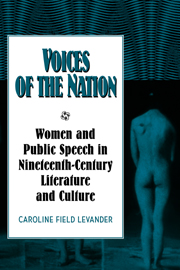Book contents
- Frontmatter
- Contents
- Acknowledgments
- Introduction: Gender, Speech, and Nineteenth-Century American Life
- 1 Bawdy Talk: The Politics of Women's Public Speech in Henry James's The Bostonians and Sarah J. Hale's The Lecturess
- 2 “Foul-Mouthed Women”: Disembodiment and Public Discourse in Herman Melville's Pierre and E. D. E. N. Southworth's The Fatal Marriage
- 3 Incarnate Words: Nativism, Nationalism, and the Female Body in Maria Monk's Awful Disclosures
- 4 Southern Oratory and the Slavery Debate in Caroline Lee Hentz's The Planter's Northern Bride and Harriet Jacobs's Incidents in the Life of a Slave Girl
- 5 Partners in Speech: Reforming Labor, Class, and the Working Woman's Body in Elizabeth Stuart Phelps's The Silent Partner
- 6 “Queer Trimmings”: Dressing, Cross-dressing, and Woman's Suffrage in Lillie Devereux Blake's Fettered for Life
- Conclusion: Women and Political Activism at the Turn into the Twentieth Century
- Notes
- Select Bibliography
- Index
- CAMBRIDGE STUDIES IN AMERICAN LITERATURE AND CULTURE
2 - “Foul-Mouthed Women”: Disembodiment and Public Discourse in Herman Melville's Pierre and E. D. E. N. Southworth's The Fatal Marriage
Published online by Cambridge University Press: 27 October 2009
- Frontmatter
- Contents
- Acknowledgments
- Introduction: Gender, Speech, and Nineteenth-Century American Life
- 1 Bawdy Talk: The Politics of Women's Public Speech in Henry James's The Bostonians and Sarah J. Hale's The Lecturess
- 2 “Foul-Mouthed Women”: Disembodiment and Public Discourse in Herman Melville's Pierre and E. D. E. N. Southworth's The Fatal Marriage
- 3 Incarnate Words: Nativism, Nationalism, and the Female Body in Maria Monk's Awful Disclosures
- 4 Southern Oratory and the Slavery Debate in Caroline Lee Hentz's The Planter's Northern Bride and Harriet Jacobs's Incidents in the Life of a Slave Girl
- 5 Partners in Speech: Reforming Labor, Class, and the Working Woman's Body in Elizabeth Stuart Phelps's The Silent Partner
- 6 “Queer Trimmings”: Dressing, Cross-dressing, and Woman's Suffrage in Lillie Devereux Blake's Fettered for Life
- Conclusion: Women and Political Activism at the Turn into the Twentieth Century
- Notes
- Select Bibliography
- Index
- CAMBRIDGE STUDIES IN AMERICAN LITERATURE AND CULTURE
Summary
In low, sweet, and changefully modulated notes … [Isabel] breathed the word mother, mother, mother! There was profound silence for a time; when suddenly … the magical untouched guitar responded with a quick spark of melody.
Herman Melville, Pierre (1852)Suddenly through the room rang a deep, bell-toned, authoritative voice, that commanded – “Pause!” … “The first-born daughter of Orville Deville is beyond your prayers” … spoke the awful voice of the invisible. A thrill of horror ran through the assembly [at] … the first word of the unseen speaker.
E. D. E. N. Southworth, The Fatal Marriage (1859)Literary critics have consistently attempted to account for the strangeness of Isabel's language by placing Herman Melville's Pierre in the context of “the thrillers of the times” and even more particularly “Mrs. E. D. E. N. Southworth's prolific domestic novels.” However, despite their impulse to pair Pierre with Southworth's fiction, scholars have not assessed the precise nature of the similarity between the two writers' projects and the possible cultural significance of their unlikely union. The above quotations provide a starting point for such an analysis by revealing that both writers are fascinated with the female voice and more specifically with the unprecedented power that listeners attribute to it because of its indeterminate position outside or beyond the body of the woman speaker. In this chapter I focus on the opportunities that this physically displaced or “disembodied” female voice creates for Southworth and Melville to formulate, within the domestic fiction that depends upon and perpetuates middle-class ideology, a radical critique of some of its major premises.
- Type
- Chapter
- Information
- Voices of the NationWomen and Public Speech in Nineteenth-Century American Literature and Culture, pp. 35 - 56Publisher: Cambridge University PressPrint publication year: 1998



